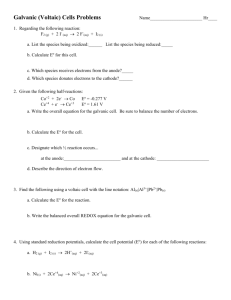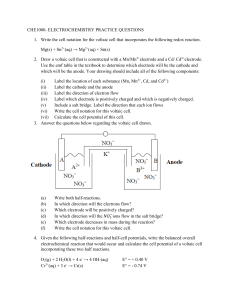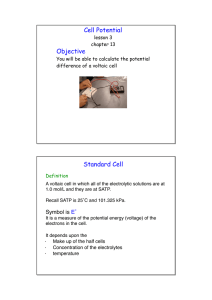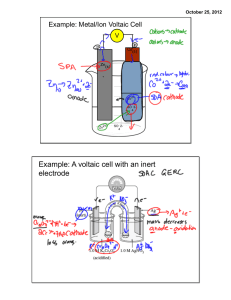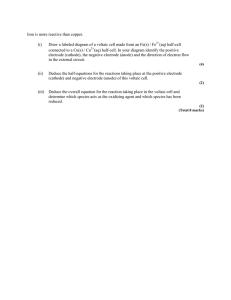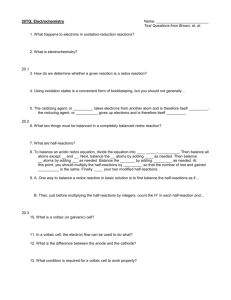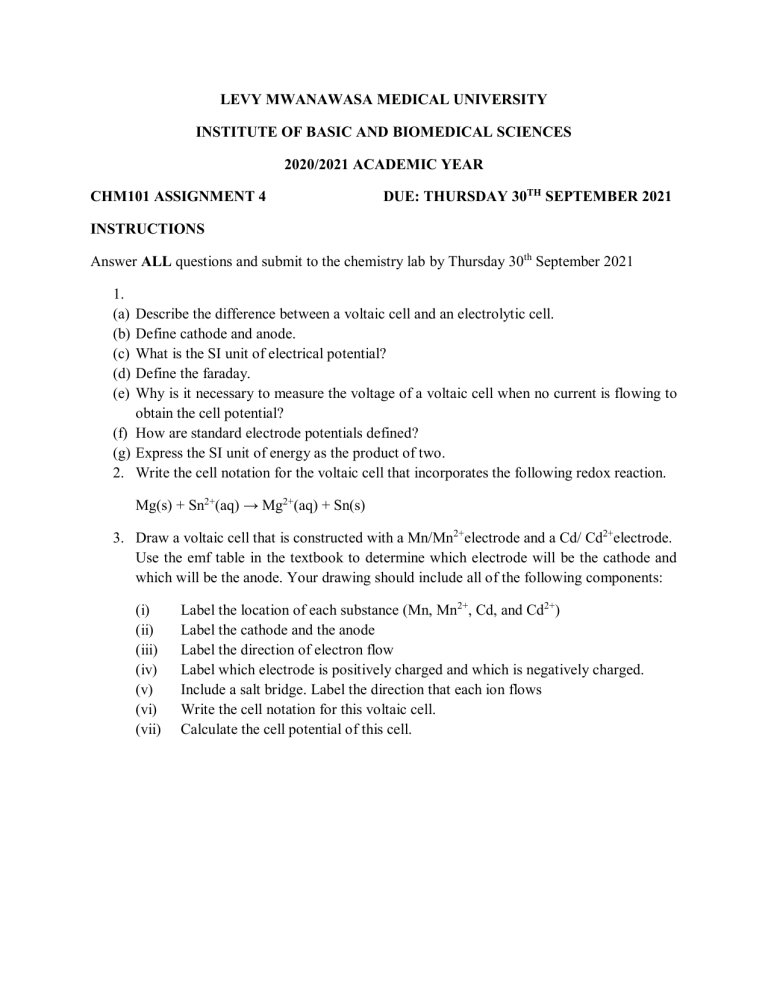
LEVY MWANAWASA MEDICAL UNIVERSITY INSTITUTE OF BASIC AND BIOMEDICAL SCIENCES 2020/2021 ACADEMIC YEAR CHM101 ASSIGNMENT 4 DUE: THURSDAY 30TH SEPTEMBER 2021 INSTRUCTIONS Answer ALL questions and submit to the chemistry lab by Thursday 30th September 2021 1. (a) (b) (c) (d) (e) Describe the difference between a voltaic cell and an electrolytic cell. Define cathode and anode. What is the SI unit of electrical potential? Define the faraday. Why is it necessary to measure the voltage of a voltaic cell when no current is flowing to obtain the cell potential? (f) How are standard electrode potentials defined? (g) Express the SI unit of energy as the product of two. 2. Write the cell notation for the voltaic cell that incorporates the following redox reaction. Mg(s) + Sn2+(aq) → Mg2+(aq) + Sn(s) 3. Draw a voltaic cell that is constructed with a Mn/Mn2+electrode and a Cd/ Cd2+electrode. Use the emf table in the textbook to determine which electrode will be the cathode and which will be the anode. Your drawing should include all of the following components: (i) (ii) (iii) (iv) (v) (vi) (vii) Label the location of each substance (Mn, Mn2+, Cd, and Cd2+) Label the cathode and the anode Label the direction of electron flow Label which electrode is positively charged and which is negatively charged. Include a salt bridge. Label the direction that each ion flows Write the cell notation for this voltaic cell. Calculate the cell potential of this cell. 4. Answer the questions below regarding the voltaic cell drawn. (a) (b) (c) (d) (e) (f) Write both half-reactions. In which direction will the electrons flow? Which electrode will be positively charged? In which direction will the 𝑁𝑂3− ions flow in the salt bridge? Which electrode decreases in mass during the reaction? Write the cell notation for this voltaic cell. 4. Given the following half-reactions and half-cell potentials, write the balanced overall electrochemical reaction that would occur and calculate the cell potential of a voltaic cell incorporating these two half reactions. O2(g) + 2 H2O(l) + 4 e- → 4 OH-(aq) Cr3+(aq) + 3 e- → Cr(s) E° = + 0.40 V E° = - 0.74 V 5. Balance the following skeleton reaction, calculate E°cell, and determine whether the reaction would be spontaneous as written. You will need to use the emf table in the textbook. Cr3+(aq) + Cu(s)→ Cr(s) + Cu2+(aq) 6. Answer the question below regarding the reaction, Cl2(g) + Fe2+(aq) → Cl-(aq) + Fe3+(aq). (i) (ii) Balance the reaction using the half-reaction method. Use the emf series in the textbook to calculate the E°cell and determine whether this reaction would occur in a voltaic cell or an electrolytic cell. 7. Calculate the cell potential for a voltaic cell with Pt/Pt 2+ and Ag/Ag+ half-cells and the initial concentrations [Pt 2+] = 0.90 M and [Ag+] = 0.20 M. Pt2+(aq) + 2 e- → Pt(s) E° = +1.20 V Ag+(aq) + e- → Ag(s) E° = +0.80 V
